|
|
|
Sort Order |
|
|
|
Items / Page
|
|
|
|
|
|
|
| Srl | Item |
| 1 |
ID:
095247
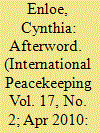

|
|
|
| 2 |
ID:
095233


|
|
|
|
|
| Publication |
2010.
|
| Summary/Abstract |
This article deconstructs the language of UN documents that relate to peace operations and highlights recurrent definitions of women as vulnerable individuals, often associated with children. The author demonstrates that the perpetuation of stereotyping language in these documents removes women's agency and maintains them in the subordinated position of victims. As a result, women are not seen as actors within their own community and agents of change in post-conflict environments. Despite the adoption of resolution 1325, the institution of the UN leaves the male monopoly of power unchallenged and presents gender mainstreaming as a non-political activity.
|
|
|
|
|
|
|
|
|
|
|
|
|
|
|
|
| 3 |
ID:
178500
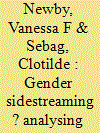

|
|
|
|
|
| Summary/Abstract |
Twenty years after the passing of Resolution 1325, the participation of women as military personnel in peacekeeping operations remains limited. Women currently comprise just under five per cent of military personnel in UN peacekeeping missions, and the UN consistently calls for more. We contend the low numbers of female military personnel in peacekeeping reflects a lack of gender mainstreaming in national militaries globally. This article introduces the problem of sidestreaming, the practice, deliberate or unintentional, of sidelining women and relegating them to specialised spaces in international peace and security while attempting gender mainstreaming or increased gender integration. Drawing on empirical evidence from national militaries we show how and where sidestreaming occurs with the result being that women remain clustered in gendered and low-status spaces in national militaries and in specialised spaces in peacekeeping operations. This has a negative effect on retention and recruitment contributing to the low numbers of female peacekeepers in UN peace operations. We conclude that gender mainstreaming in its fullest sense will require military reform that decouples violence and combat skills from masculinity and inclusive research strategies that engage men as well as women.
|
|
|
|
|
|
|
|
|
|
|
|
|
|
|
|
| 4 |
ID:
160883
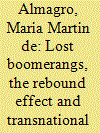

|
|
|
|
|
| Summary/Abstract |
This article aims to show the added value of studying transnational advocacy networks through a discursive approach in order to better understand the outcomes of norm diffusion in postconflict contexts. I argue that constructivist approaches to norm diffusion fall short as an explanation of norm adoption because they assume an automatic process of norm propagation through socialisation mechanisms. The first goal of the article is then to discuss how the internal dynamics of discourse negotiation in transnational advocacy networks impact the diffusion and implementation of international norms. The second goal is to propose the concept of the rebound effect and to explore the conditions under which it takes place. Through data collected during extended fieldwork, the article examines a prominent case, namely the transnational campaign for the implementation of United Nations Security Council Resolution 1325 on Women, Peace, and Security in Burundi and Liberia. I ask why and how the campaign was understood as a success in Liberia and as a failure in Burundi. I argue that there is another way of looking at these cases in less dichotomised ways. Crucially, my findings demonstrate how in both cases a very particular discourse on gender security is (re)produced through power relations between local and transnational activists limiting the type of policies that are advocated for and depoliticising the grassroots.
|
|
|
|
|
|
|
|
|
|
|
|
|
|
|
|
| 5 |
ID:
175777


|
|
|
|
|
| Summary/Abstract |
The position presented in this article is based on the belief that most women in Israel, regardless of their ethnicity, education level, or political agenda, strive to live in peace. Although most of them may believe it impossible and many may believe that they cannot promote peace in any way, as studies of global peace processes and agreements suggest, peace requires wide public support from across as many sectors as possible.
|
|
|
|
|
|
|
|
|
|
|
|
|
|
|
|
| 6 |
ID:
101723
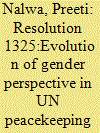

|
|
|
|
|
| Publication |
2011.
|
| Summary/Abstract |
The year 2010 commemorated ten years of the adoption of Resolution 1325 by the UNSC but the commemoration is without celebration. The apparent dissonance between the policy and the practice of the Resolution 1325 renders it inappropriate. This paper reviews the evolution of gender perspective in UN peacekeeping operations and assesses the gains and failures of the Resolution 1325 in gender balancing, recruitment and retention of women in the security sector. This assessment would indicate why the celebration is missing, primarily because through the decade, the progress in gender mainstreaming in the scope and breadth of peacekeeping missions, as reflected by statistical data, has been dismal
|
|
|
|
|
|
|
|
|
|
|
|
|
|
|
|
| 7 |
ID:
092259
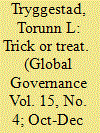

|
|
|
|
|
| Publication |
2009.
|
| Summary/Abstract |
The adoption in October 2000 of UN Security Council Resolution 1325 on Women, Peace and Security is regarded as a groundbreaking achievement in putting women's rights on the peace and security agenda of the UN. Critics have suggested that the adoption of this resolution has made little difference in terms of changed policies and practices. I argue, however, that it has nevertheless made a difference. The adoption of Resolution 1325 is the expression of a new norm in the making. Furthermore, it illustrates how cross-cutting thematic issues such as "women, peace, and security" today are placed on the agenda and nurtured by the UN Secretariat in close cooperation not only with member states, but, just as important, with networks of nongovernmental organizations and individual experts
|
|
|
|
|
|
|
|
|
|
|
|
|
|
|
|
|
|
|
|
|